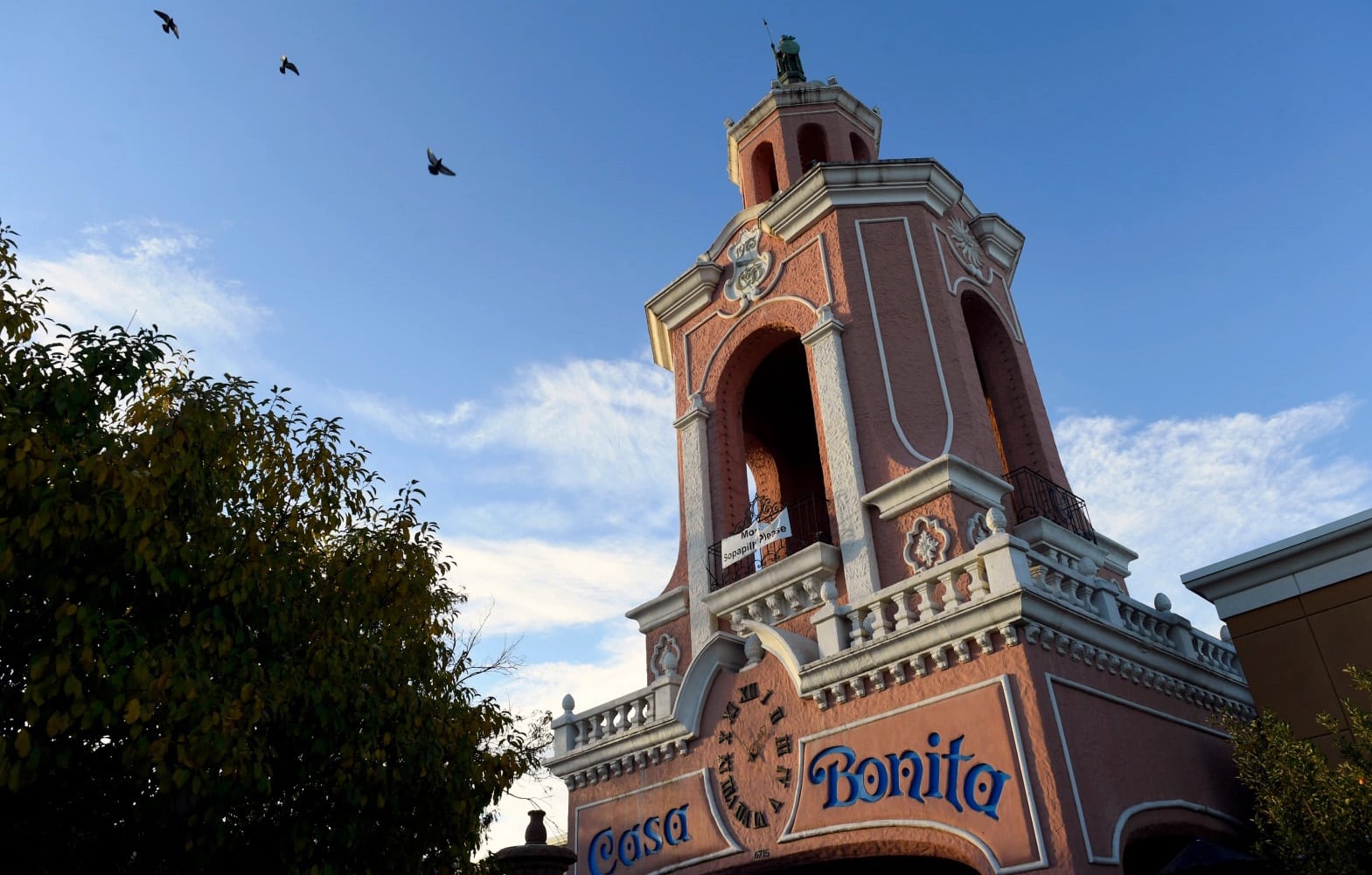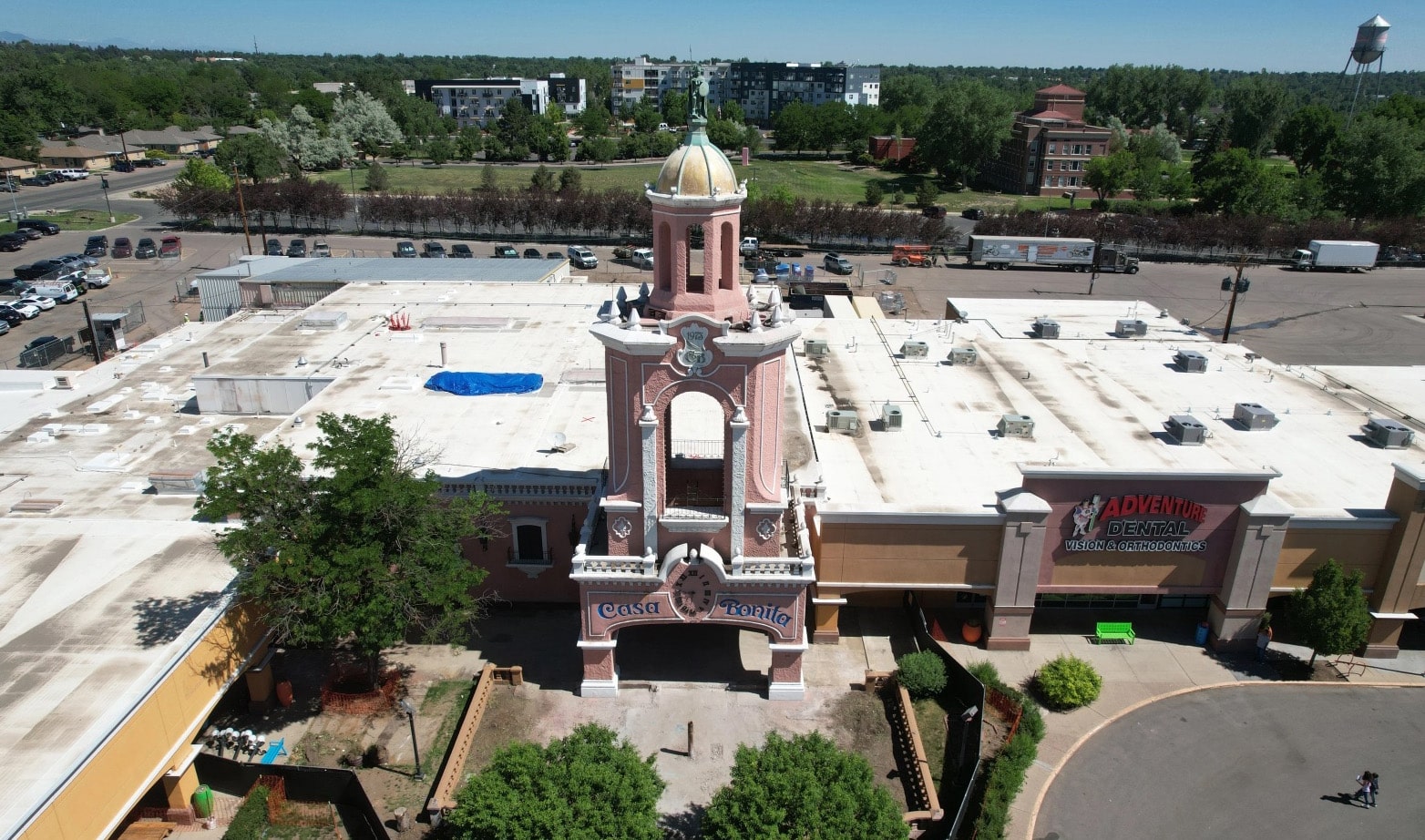
Trey Parker and Matt Stone, creators of “South Park,” purchased Casa Bonita in 2021. The owners sued and won a court injunction that prevents the city of Lakewood from releasing building plans to the media. (Helen H. Richardson/The Denver Post)
In a strange saga last week, one of the state’s iconic restaurants used a war on terror-era law to block the release of records that have long been made public in Colorado without much consideration or consternation.
For local advocates and lawyers who fight for the public’s right to know about what governments and government-regulated businesses are doing, it raises an important question: Was the unusual legal skirmish a one-off decision or a cause for lasting concern?
“When you originally hear about Casa Bonita’s owners challenging this, you’re going, ‘Really?’” said Jeff Roberts, director of the Colorado Freedom of Information Coalition, which advocates for releasing public records. “But if you think about what they brought up as their reasons, a few years ago that would have never crossed any of our minds and now you go, ‘Yeah, maybe.’”
The Lakewood restaurant, which is being renovated at considerable expense by “South Park” creators Trey Parker and Matt Stone, won an injunction in Jefferson County District Court last Tuesday that prevents the city of Lakewood from releasing 121 pages of building plans to news outlets while the restaurant’s lawyers determine if the plans pose a security risk.
“It’s not unprecedented but it doesn’t happen all that often that a private entity sues a government entity to force them to withhold information,” said Steve Zansberg, a longtime media law attorney in Denver who often represents news outlets seeking documents.
Casa Bonita’s reasoning was even rarer. Jessica Smith, an attorney with Holland & Hart representing the restaurant, argued that a “critical infrastructure” exemption to the Colorado Open Records Act — created after 9/11 to protect the blueprints of bridges, electrical grids, dams and the like — could apply to Casa Bonita in this age of mass shootings.
“Look, I took my kids there when they were younger,” Zansberg said. “It is an institution, a historic landmark and all that. But to call that restaurant critical infrastructure is stretching those words beyond their reasonable meaning.”
Judge Randall Arp agreed last week that “it’s a stretch to refer to a restaurant as critical infrastructure,” even as he granted a 21-day restraining order to give Smith and Lakewood time to reach an agreement on what should and should not be released.
“This is an interesting case and we think it was a sound, defensible ruling,” Mike Waldinger, CEO of the Colorado chapter of the American Institute of Architects, said in an email. Thomas Vonier, a former national president of the AIA, agreed in an interview.
“I think the public does not need to know the details,” he said. “It’s better for public security if they’re more closely held. If people are concerned about matters like egress or fire protection, most cities … have competent city officials who review those plans and pass judgment.”
“That doesn’t mean there couldn’t be (release of) some kind of schematic drawing or something that’s very general and shows rooms, where the kitchens are, things of that nature. But I don’t really understand what the public need is for disclosure of something like that.”
News outlets, including BusinessDen, use building plans to inform the public about new construction, usually in broad terms such as square footage, while ensuring governments are doing their job. But renovations at Casa Bonita, which Parker and Stone say have been far more expensive than expected, drew public interest in even small details.
Such details were first reported by 9News, which later agreed to remove some of them at the request of Smith, who worried they revealed security plans. Smith is particularly concerned about documents showing the location of cameras and security officers.
“There’s a level of detail that may include things that may be contrary to the public interest,” Roberts said. He later added, “But I don’t like the idea of this being the way it always is.”
“I would hope that this doesn’t become a trend,” Zansberg said. “I will get worried if a second such instance occurs. I’m not losing a lot of sleep over this one particular skirmish.”

Trey Parker and Matt Stone, creators of “South Park,” purchased Casa Bonita in 2021. The owners sued and won a court injunction that prevents the city of Lakewood from releasing building plans to the media. (Helen H. Richardson/The Denver Post)
In a strange saga last week, one of the state’s iconic restaurants used a war on terror-era law to block the release of records that have long been made public in Colorado without much consideration or consternation.
For local advocates and lawyers who fight for the public’s right to know about what governments and government-regulated businesses are doing, it raises an important question: Was the unusual legal skirmish a one-off decision or a cause for lasting concern?
“When you originally hear about Casa Bonita’s owners challenging this, you’re going, ‘Really?’” said Jeff Roberts, director of the Colorado Freedom of Information Coalition, which advocates for releasing public records. “But if you think about what they brought up as their reasons, a few years ago that would have never crossed any of our minds and now you go, ‘Yeah, maybe.’”
The Lakewood restaurant, which is being renovated at considerable expense by “South Park” creators Trey Parker and Matt Stone, won an injunction in Jefferson County District Court last Tuesday that prevents the city of Lakewood from releasing 121 pages of building plans to news outlets while the restaurant’s lawyers determine if the plans pose a security risk.
“It’s not unprecedented but it doesn’t happen all that often that a private entity sues a government entity to force them to withhold information,” said Steve Zansberg, a longtime media law attorney in Denver who often represents news outlets seeking documents.
Casa Bonita’s reasoning was even rarer. Jessica Smith, an attorney with Holland & Hart representing the restaurant, argued that a “critical infrastructure” exemption to the Colorado Open Records Act — created after 9/11 to protect the blueprints of bridges, electrical grids, dams and the like — could apply to Casa Bonita in this age of mass shootings.
“Look, I took my kids there when they were younger,” Zansberg said. “It is an institution, a historic landmark and all that. But to call that restaurant critical infrastructure is stretching those words beyond their reasonable meaning.”
Judge Randall Arp agreed last week that “it’s a stretch to refer to a restaurant as critical infrastructure,” even as he granted a 21-day restraining order to give Smith and Lakewood time to reach an agreement on what should and should not be released.
“This is an interesting case and we think it was a sound, defensible ruling,” Mike Waldinger, CEO of the Colorado chapter of the American Institute of Architects, said in an email. Thomas Vonier, a former national president of the AIA, agreed in an interview.
“I think the public does not need to know the details,” he said. “It’s better for public security if they’re more closely held. If people are concerned about matters like egress or fire protection, most cities … have competent city officials who review those plans and pass judgment.”
“That doesn’t mean there couldn’t be (release of) some kind of schematic drawing or something that’s very general and shows rooms, where the kitchens are, things of that nature. But I don’t really understand what the public need is for disclosure of something like that.”
News outlets, including BusinessDen, use building plans to inform the public about new construction, usually in broad terms such as square footage, while ensuring governments are doing their job. But renovations at Casa Bonita, which Parker and Stone say have been far more expensive than expected, drew public interest in even small details.
Such details were first reported by 9News, which later agreed to remove some of them at the request of Smith, who worried they revealed security plans. Smith is particularly concerned about documents showing the location of cameras and security officers.
“There’s a level of detail that may include things that may be contrary to the public interest,” Roberts said. He later added, “But I don’t like the idea of this being the way it always is.”
“I would hope that this doesn’t become a trend,” Zansberg said. “I will get worried if a second such instance occurs. I’m not losing a lot of sleep over this one particular skirmish.”

